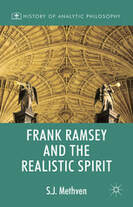Book
|
Frank Ramsey and the Realistic Spirit
Palgrave Macmillan, 2015. This book explicates and expands upon Frank Ramsey's notion of the realistic spirit. The first to provide a systematic reading of his work, it demonstrates the extent of Ramsey's genius as evinced by his responses to the Tractatus Logico-Philosophicus, and by the impact he had on Wittgenstein's later philosophical insights. You can see some reviews here and here. |
articles
Review of The Logical Alien: Conant and his Critics, ed. S. Miguens
Mind, 2021
Ramsey's Record: Wittgenstein on Infinity and Generalization
The British Journal for the History of Philosophy, 2020
In the Ramsey Archive at the Hillman Library of the University of Pittsburgh, there is a note in Ramsey's hand and mostly in German, consisting of twenty paragraphs the contents of which deal, in large part, with the infinite and generality. In this article, I provide an English translation of that note, followed by a philosophical commentary.
Review: Irad Kimhi, Thinking and Being, Harvard University Press 2018
The European Journal of Philosophy, October 2019
Ramsey, 'Universals' and Atomic Propositions.
The British Journal for the History of Philosophy, 2019
In 1925, Ramsey declared that the forms of atomic propositions were unknowable. Less than a year later, he had changed his mind: they might be discoverable by analysis. In this article, I provide reasons that justify Ramsey's change of heart: most surprisingly, that three theses he held at the time prove to be inconsistent.
Sense and the Identity Conception of Truth
The European Journal of Philosophy, 2018
The identity conception of truth holds that a thinkable is true just in case it is a fact. As such, it sets itself against correspondence theories of truth, while respecting the substantive role played by truth in respect of enquiry.
In this article, I motivate and develop that view, and, in so doing, promote a particular conception of sense.
Whistling in 1929: Ramsey and Wittgenstein on the Infinite
The European Journal of Philosophy, 2016
The standard interpretation of Ramsey's famous quip takes him to be objecting to or rejecting Wittgenstein's Tractarian distinction between saying and showing. Cora Diamond has recently criticised this interpretation; whilst I agree with her discussion of the legend, I argue that we should understand Ramsey as making a claim about the grammar of the logical connectives.
Mind, 2021
Ramsey's Record: Wittgenstein on Infinity and Generalization
The British Journal for the History of Philosophy, 2020
In the Ramsey Archive at the Hillman Library of the University of Pittsburgh, there is a note in Ramsey's hand and mostly in German, consisting of twenty paragraphs the contents of which deal, in large part, with the infinite and generality. In this article, I provide an English translation of that note, followed by a philosophical commentary.
Review: Irad Kimhi, Thinking and Being, Harvard University Press 2018
The European Journal of Philosophy, October 2019
Ramsey, 'Universals' and Atomic Propositions.
The British Journal for the History of Philosophy, 2019
In 1925, Ramsey declared that the forms of atomic propositions were unknowable. Less than a year later, he had changed his mind: they might be discoverable by analysis. In this article, I provide reasons that justify Ramsey's change of heart: most surprisingly, that three theses he held at the time prove to be inconsistent.
Sense and the Identity Conception of Truth
The European Journal of Philosophy, 2018
The identity conception of truth holds that a thinkable is true just in case it is a fact. As such, it sets itself against correspondence theories of truth, while respecting the substantive role played by truth in respect of enquiry.
In this article, I motivate and develop that view, and, in so doing, promote a particular conception of sense.
Whistling in 1929: Ramsey and Wittgenstein on the Infinite
The European Journal of Philosophy, 2016
The standard interpretation of Ramsey's famous quip takes him to be objecting to or rejecting Wittgenstein's Tractarian distinction between saying and showing. Cora Diamond has recently criticised this interpretation; whilst I agree with her discussion of the legend, I argue that we should understand Ramsey as making a claim about the grammar of the logical connectives.
SELECTED Talks
|
Nov 2019 |
'Epistemic Disquiet and Historical Contingency'
New College of the Humanities, London |
|
May 2018 |
'On Saying What One Thinks'
Leipzig University Philosophy Colloquium, University of Leipzig |
|
Jan 2018 Dec 2017 |
'On the Necessity of Self-Consciousness: Ramsey and Knowing One's Own Mind'
Stirling Early Analytic Group: Ramsey Workshop, University of Stirling. History of Philosophy Seminar, University of Toronto. |
|
Dec 2017 |
'Ramsey and Conceptual Engineering'
Cappelen and Rattan: Conceptual Engineering Workshop, University of Toronto. |
|
May 2017 Jan 2017 |
'A Note on a Note: Ramsey, "Universals", and Atomic Propositions'
Society for the Study of the History of Analytic Philosophy, Annual Meeting, University of Calgary. Ramsey Workshop, University of Lund, Sweden. |
|
Nov 2016 May 2016 |
'The Identity Theory of Truth'
Philosophy Colloquium, Trinity College, Dublin. Conference on the Identity Theory of Truth, Trinity College, Cambridge. |
|
May 2014 |
'Ramsey’s Logical Revolt: Hilbert and the Entscheidungsproblem'
Society for the History of Analytic Philosophy, Montreal. |
|
July 2012 |
'Is Hero Hopeless? Against neo-Fregean logicism'
Foundations of Mathematics: What are they and what are they for? Fitzwilliam College, Cambridge. |
|
Aug 2011 |
'Pragmatic Inference'
34th International Wittgenstein Symposium, Kirchberg, Austria. |
|
June 2011 |
'Justification and Logical Truth: Ramsey and the Axiom of Infinity'
Logicism Today, Besse-en-Chandesse. |
|
June 2011 |
'Playing Not-Bridge: Ramsey and Wittgenstein on Inference'
Moral Sciences Club, Cambridge. |
